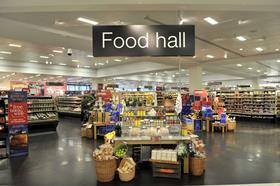
M&S could struggle to win over weekly food shoppers, analysts have warned, after the retailer announced plans toexpand its food offer.
The chain announced at the weekend that it wants to change the perception that it is mainly for singles and couples and attract families to buy their weekly groceries from its stores.
The plan is to open several supermarket-sized stores to broaden its food range, as well as redesigning existing shops so that areas which currently display clothes can sell food instead. This will meana full range of food products is offered in more stores.
In a message published by The Mail on Sunday the chain’s new managing director for food Stuart Machin told suppliers he wanted to steal customers from the likes of Waitrose, Sainsbury’s and Tesco.
“It is assumed thatM&S Foodisn’t a full-range business. That is not true. Our full range is unrivalled in taste and quality,” he wrote.
“We have over 6,500 lines, we just don’t get them in front of enough customers. Our full range is only available in a dozen or so stores. This must change, and it will.”
He added: “We are starting a store renewal programme that will get more products in front of more customers with bigger, better M&S Food Halls in new and existing sites.”
The plan comes after M&Spurchased half of Ocado’s home delivery business for £750 millionlast month.
Thomas Brereton, retail analyst for data and analytics firm GlobalData,warned the retailer faces an “uphill battle” to win over weekly food shoppers.
“It is understandable thatM&S Food’s managing directorStuart Machinis looking to expand the food side of the business; over the last decade, M&S has increasingly relied on its food division as its clothing and home side has suffered, with food now responsible for 61 per cent of group sales – up from 52 per cent in 2009.
“However, simply offering a full range of food products in more stores will not instantly convert into sales – it will take time for the new proposition to resonate with target consumers, who are more used to shopping at other ‘premium’ players such as Waitrose or Sainsbury’s for the mainstay of their grocery shops.
“Only two per cent of shoppers currently do their full shop at M&S, and it will be an uphill challenge to convince others to switch from their usual supermarkets – even with M&S’s concurrent focus on reducing prices and providing value.
“It’s also an unusual decision to redistribute investment towards larger spaces; average store size at the larger supermarkets has been falling over recent years following the repositioning of store portfolios to focus on closer, smaller shops, to capitalise on the growing demand for convenience.”
Despite these reservations, Brereton said the move was not necessarily a bad one in the long term, but he warnedit could be an “onerous task” to juggle expanding food space, ensuring the joint venturewith Ocado is correctly managed, and “convincing shoppers of a new ‘value’ premise that contrasts with M&S’s long-standing premium reputation”.



